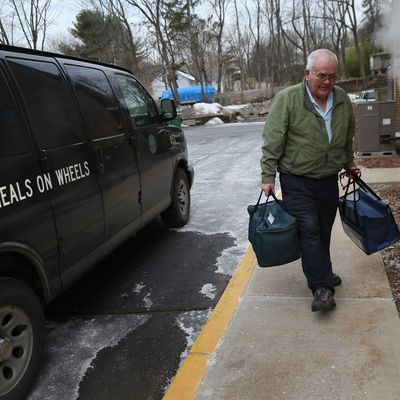
President Trump’s new budget would increase defense spending by $54 billion — while slashing funding for medical research, climate science, public housing, education, aid to the indigent, infrastructure, and many, many other things.
On Thursday morning, the White House’s budget director Mick Mulvaney explained that these changes were inspired by one, simple question: “Can we ask the taxpayer to pay for this?”
Here’s what he said:
“When you start looking at places that we reduce spending, one of the questions we asked was, can we really continue to ask a coal miner in West Virginia or a single mom in Detroit to pay for these programs? The answer was no,” Mulvaney told MSNBC’s Morning Joe. “We can ask them to pay for defense, and we will, but we can’t ask them to continue to pay for the Corporation for Public Broadcasting.”
This was a bizarre defense of the Trump budget for several reasons. To name just three:
(1) The U.S. already spends more more on its military than China, Russia, Saudi Arabia, the United Kingdom, France, India, and Germany — combined. By contrast, America spends far less than its peers (per capita) on many of the initiatives that the Trump’s budget cuts.
(2) Trump’s proposal cuts many programs that are more intuitively valuable to coal miners in West Virginia — and single mothers in Detroit — than a 10 percent increase in defense spending. The president’s budget cuts funding for early-childhood education, public housing, transit, food assistance, and job training — all programs that disproportionately benefit single mothers in cities with low median incomes. And it also abolishes the Appalachian Regional Commission and Rural Business-Cooperative Service, while shrinking the Labor Department — all moves that disadvantage coal miners.
(3) If the White House feels bad about taking money from coal miners and single mothers, then why is one of its top priorities to pass an enormous, regressive tax cut?
CNN’s Jim Acosta asked Mulvaney to address some of the contradictions in his argument at a White House press briefing Thursday afternoon.
And here’s what happened …
“Just to follow up on that, you were talking about the steel worker in Ohio, coal worker in Pennsylvania, but they may have an elderly mother who depends on the Meals on Wheels program or who may have kids in Head Start,” Acosta said. “Yesterday, or the day before, you described this as a hard-power budget. Is it also a hard-hearted budget?”
“No, I don’t think so,” Mulvaney replied. “I think it’s probably one of the most compassionate things we can do.”
“To cut programs that help the elderly and kids?” Acosta asked, incredulously.
“You’re only focusing on half of the equation, right? You’re focusing on the recipients of the money. We’re trying to focus on both the recipients of the money and the folks who give us the money in the first place,” Mulvaney explained. “And I think it’s fairly compassionate to go to them and say, ‘Look, we’re not gonna ask you for your hard-earned money, anymore, single mother of two in Detroit … unless we can guarantee to you that that money is actually being used in a proper function.’”
This is obscene. In addition to the cuts already mentioned, Trump’s budget slashes rental assistance and home-energy aid to low-income families. His plan would almost certainly increase the rate of homelessness and malnutrition experienced by the children of single mothers in Detroit.
Mulvaney’s argument doesn’t even make sense on its own terms. By itself, this budget has no impact on taxes — it just transfers federal spending from programs that directly benefit working families to ones that don’t. And the Trump administration has expressed no interest in significantly cutting payroll or sales taxes, which make up the bulk of many a Detroit resident’s tax burden.
On Thursday, the White House explained that the key distinction between the Defense department and the anti-poverty programs it wishes to cut is that the latter have “failed to meet their objectives.”
Here is how Trump described the return on investment that the Pentagon has provided the American people, back when he was running for president.
We’ve spent $4 trillion trying to topple various people that, frankly, if they were there and if we could have spent that $4 trillion in the United States to fix our roads, our bridges, and all of the other problems — our airports and all the other problems we have — we would have been a lot better off, I can tell you that right now.
We have done a tremendous disservice not only to the Middle East — we’ve done a tremendous disservice to humanity. The people that have been killed, the people that have been wiped away — and for what? It’s not like we had victory. It’s a mess. The Middle East is totally destabilized, a total and complete mess. I wish we had the 4 trillion dollars or 5 trillion dollars. I wish it were spent right here in the United States on schools, hospitals, roads, airports, and everything else that are all falling apart!
In light of this stellar record, increasing the rate of child homelessness to finance new weapons systems is one of “the most compassionate things we can do.” Just go to Detroit and ask a single mother.






























